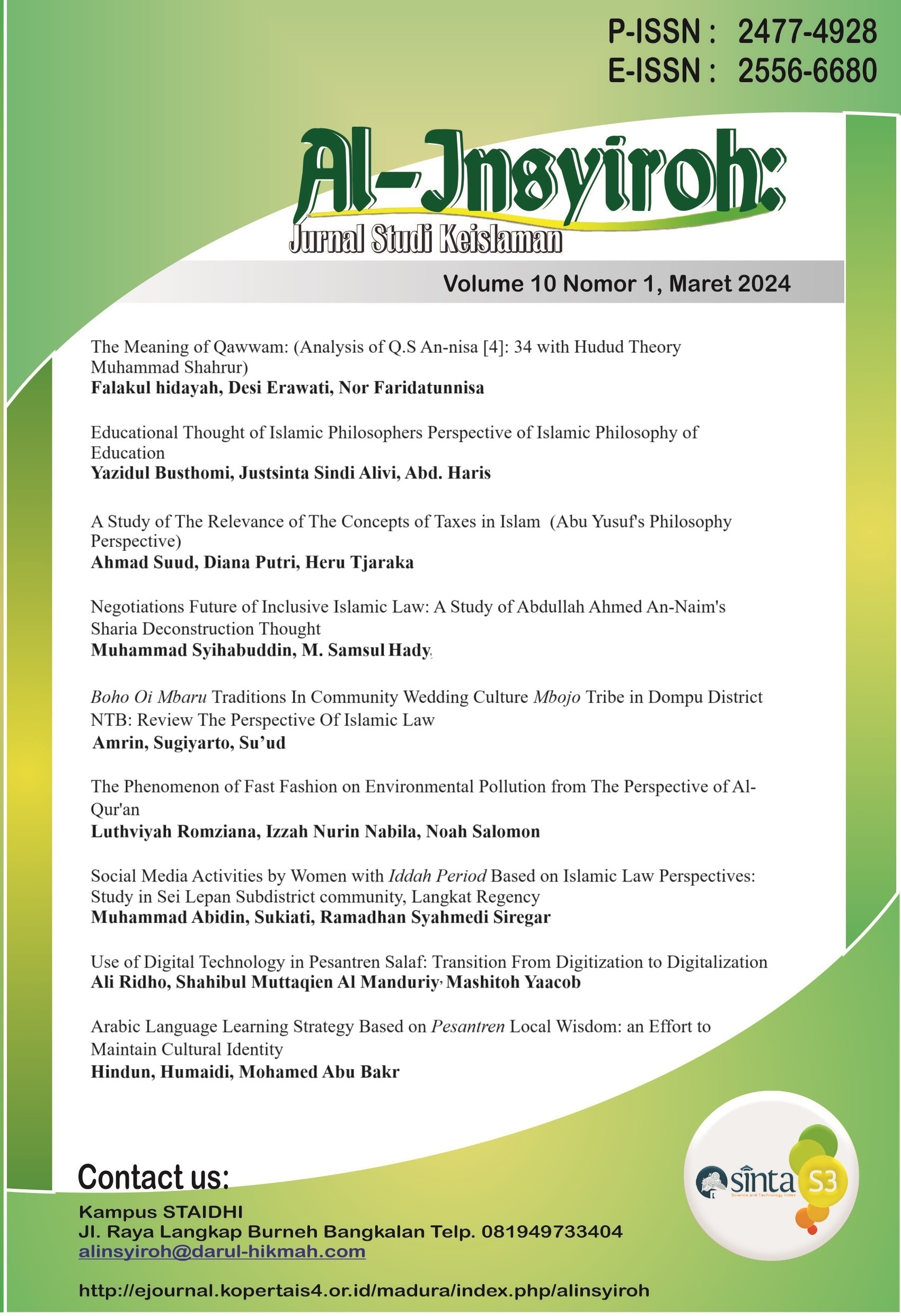Boho Oi Mbaru Traditions In Community Wedding Culture Mbojo Tribe in Dompu District NTB: Review The Perspective Of Islamic Law
DOI:
https://doi.org/10.35309/alinsyiroh.v10i1.7171Keywords:
Local culture, Boho oi mbaru, Islamic law.Abstract
This research aims to find out how the practice and review of Islamic Law in the Boho Oi Mbaru tradition at weddings of the Mbojo Tribe community in Dompu Regency, West Nusa Tenggara Province. This research uses descriptive qualitative research with a field study approach from anthropology and sociology. The collection techniques are observation, interviews and documentation. Meanwhile, data analysis processing techniques use reduction, data presentation and drawing conclusions. The results of this research show that first, the process of implementing the Boho Oi Mbaru Tradition is the Boho Oi Mbaru Tradition, a custom of the people of Dompu Regency at weddings. This Boho Oi Mbaru tradition is carried out before the wedding ceremony. In this tradition, only the bride is bathed, while the groom is not bathed. The aim is to hope that the bride will not act like she did when she was a girl, and the community believes that carrying out this tradition can produce offspring who are worthy and obedient to their parents, and diligent in worship. Second, the view of Islamic law regarding the practice of Boho Oi Mbaru in community marriage customs is permissible because looking at the procedures for its implementation and its purpose there are no elements that give rise to sharia arguments, as long as the community customs do not conflict with the Koran and al-Hadith then permitted, unless the custom violates the provisions of Islamic law. Thus, it is necessary for the Dompu community and government to be able to maintain and maintain the identity of the Dompu in all activities, especially at weddings..References
Amrin, Adi Priyono, Supriyanto, Nurrahmania. “Analysis of Local Wisdom in Bima Community Marriage ( Study of Socio- Cultural Values ).†Legal Brief 11, no. 4 (2022): 2418–25. https://doi.org/10.35335/legal.xx.xx.
Amrin Amrin, Muthoifin Muthoifin, Sudarno Shobron, Heldy Ramadhan Putra P. “Islamic Values of the Peta Kapanca Tradition at the Mbojo Tribe’s Marriage, West Nusa Tenggara, Indonesia.†Cakrawala:Jurnal Studi Islam 15, no. 2 (2020): 15–26. https://doi.org/https://doi.org/10.31603/cakrawala.3405.
Amrin, Amrin, Mas’udatul Fitriyah, Abdul Hamid, and Euis Amalia. “Peta Kapanca As the Existence of Islamic Marriage in Bima Indonesia,†2023. https://doi.org/10.4108/eai.19-10-2022.2333027.
Ataullahjan, Anushka, Zubia Mumtaz, Helen Vallianatos. “Family Planning, Islam and Sin: Understandings of Moral Actions in Khyber Pakhtunkhwa, Pakistan.†Social Science & Medicine 230 (2019): 49–56.
Bach Baoueb, Sallouha Lamia. “Tunisian Hip-Hop Music Discourse: Linguistic, Socio-Cultural and Political Movements from the Local to the Global or Vice Versa? A Case Study of Balti’s Songs.†Language and Communication 75 (2020): 1–20. https://doi.org/10.1016/j.langcom.2020.07.005.
Bazarkulova, Dana, and Janice Compton. “Marriage Traditions and Investment in Education: The Case of Bride Kidnapping.†Journal of Comparative Economics 49, no. 1 (2021): 147–63. https://doi.org/10.1016/j.jce.2020.07.005.
Chudova, T. I. “Food Symbolism in the Context of Komi (Zyrians) Wedding Rituals.†Archaeology, Ethnology and Anthropology of Eurasia 39, no. 3 (2011): 128–34. https://doi.org/10.1016/j.aeae.2011.09.002.
Dalkılıç, Neslihan, and Adnan Nabikoğlu. “Documentation and Analysis of Structural Elements of Traditional Houses for Conservation of Cultural Heritage in Siverek (Şanlıurfa, Turkey).†Frontiers of Architectural Research 9, no. 2 (2020): 385–402. https://doi.org/10.1016/j.foar.2019.11.003.
Departemen Agama RI. Al-Qur’an Dan Terjemahannya. Semarang: Kudasmoro Grafindo, 1994.
Doucerain, Marina M. “Moving Forward in Acculturation Research by Integrating Insights from Cultural Psychology.†International Journal of Intercultural Relations 73, no. July (2019): 11–24. https://doi.org/10.1016/j.ijintrel.2019.07.010.
Hadijah, Lailan. “Local Wisdom in Minangkabau Cultural Tradition of Randai.†KnE Social Sciences 2019 (2019): 399–411. https://doi.org/10.18502/kss.v3i19.4871.
Harpen Dwi Jaksana, Sunardi, Ahmad AM. “Bima Morality: Asketic Values To Reduce Disrupted Era Through Historical Learning.†International Journal of Education and Social Science Research 2, no. 04 (2019): 52–62.
Imam Ghazali. Al-Mustasfa Min Al-Usul, Jilid II. Cairo: Amiriyah, 1442.
Inhorn, Marcia C., Daphna Birenbaum-Carmeli, Mira D. Vale, and Pasquale Patrizio. “Abrahamic Traditions and Egg Freezing: Religious Women’s Experiences in Local Moral Worlds.†Social Science and Medicine 253, no. December 2019 (2020): 112976. https://doi.org/10.1016/j.socscimed.2020.112976.
Lee, Kyung Yur, and Hoon Lee. “Traditional Costume Experience at a Cultural Heritage Festival.†Tourism Management Perspectives 32, no. July (2019): 100555. https://doi.org/10.1016/j.tmp.2019.100555.
Lin, Ying, Sharon Arieli, and Daphna Oyserman. “Cultural Fluency Means All Is Okay, Cultural Disfluency Implies Otherwise.†Journal of Experimental Social Psychology 84, no. July (2019): 1–14. https://doi.org/10.1016/j.jesp.2019.103822.
M. Facrir Rahman, Nurmukminah. Mbojo Married between Islam and Tradition. Mataram: Alam Tara Lenin Institute, 2011.
Muhammad, Rosmaliza, Mohd Salehuddin Mohd Zahari, Alina Shuhaida Muhammad Ramly, and Roslina Ahmad. “The Roles and Symbolism of Foods in Malay Wedding Ceremony.†Procedia - Social and Behavioral Sciences 101 (2013): 268–76. https://doi.org/10.1016/j.sbspro.2013.07.200.
Nelson, Michelle R., and Cele C. Otnes. “Exploring Cross-Cultural Ambivalence: A Netnography of Intercultural Wedding Message Boards.†Journal of Business Research 58, no. 1 SPEC.ISS (2005): 89–95. https://doi.org/10.1016/S0148-2963(02)00477-0.
Pajarianto, Hadi, Imam Pribadi, and Puspa Sari. “Tolerance between Religions through the Role of Local Wisdom and Religious Moderation.†HTS Teologiese Studies / Theological Studies 78, no. 4 (2022): 1–8. https://doi.org/10.4102/hts.v78i4.7043.
Petrova, S. I. “Clothing in Yakut Traditional Wedding Rituals (19th-20th Centuries).†Archaeology, Ethnology and Anthropology of Eurasia 38, no. 2 (2010): 106–10. https://doi.org/10.1016/j.aeae.2010.08.014.
“Results of an Interview with H. Abbas (Traditional Figure) on January 2 2023, 14.30 WITA.,†n.d.
“Results of an Interview with Marnah (Traditional Figure) on January 5 2023, 18.30 WITA.,†n.d.
“Results of an Interview with Siti Hawa (Traditional Figure) on January 11 2023, 18.30 WITA.,†n.d.
“Results of an Interview with Suherman (District Traditional Leader) on January 7 2023, 16.30 WITA.,†n.d.
“Results of Interview with Ismail (Traditional and Community Leader) on January 5 2023, 15.55 WITA.,†n.d.
Samaddar, Arindam, Rosa Paula Cuevas, Marie Claire Custodio, Jhoanne Ynion, Anindita Ray (Chakravarti), Suva Kanta Mohanty, and Matty Demont. “Capturing Diversity and Cultural Drivers of Food Choice in Eastern India.†International Journal of Gastronomy and Food Science 22, no. July (2020): 100249. https://doi.org/10.1016/j.ijgfs.2020.100249.
Shobron, Amrin, and Muthoifin Rosyadi, Imron. “Islamic Education Values in the Tradition of Peta Kapanca of Mbojo Community Tribe in West Nusa Tenggara.†International Journal of Advanced Science and Technology 29, no. 5 (2020): 6802–12.
Sriyanto, Mr., Edi Kurniawan, and Halim Sukma Aji. “Local Wisdom of Kandri Village as a Form of Environmental Conservation,†no. January (2019). https://doi.org/10.2991/icorsia-18.2019.44.
Sugiyono. Metode Penelitian Kuantitatif, Kualitatif Dan R&D. Bandung: CV. Alfabeta, 2016.
Susanto, Tantut, Hanny Rasni, Latifa Aini Susumaningrum, Ira Rahmawati, Rismawan Adi Yunanto, and Eka Afdi Septiyono. “Caring for Adolescents Based on the Wisdom of Indonesian Pandalungan Culture: An Ethnonursing Pilot Study.†Journal of Pediatric Nursing 55, no. xxxx (2020): e270–78. https://doi.org/10.1016/j.pedn.2020.05.015.
Tono, Sidik, M. Roem Syibly, Amir Mu’allim, Ahmad Nurozi, and Muhammad Roy Purwanto. “The Harmonious Relationship between Minangkabau Custom and Islam in the Distribution of Inheritance.†Al-Shajarah 2019, no. Special Issue Sharia hand Law (2019): 39–55.
Wahid, Abdul. “Doa Kasaro And Its Cultural Codes In Muslim Society Of Bima , Eastern Indonesia.†Ulumuna 23, no. 2 (2019): 361–83.
Wardatun, Atun. “Ampa Co’i Ndai: Local Understanding of Kafa’a in Marriage among Eastern Indonesian Muslims.†Al-Jami’ah 54, no. 2 (2016): 311–36. https://doi.org/10.14421/ajis.2016.542.311-336.
Yono, Amrin, Ade Irmah Imamah. “Alignment of Local Wisdom Values with Islamic Law in the Tradition of the Peta Kapanca Ceremony.†Hayula: Indonesian Journal of Multidisciplinary Islamic Studies 6, no. 1 (2022): 59–80. https://doi.org/https://doi.org/10.21009/hayula.006.02.02.
Zitser, Ernest A. “From Lubok to Libel: Nineteenth-Century Russian Historiography and Popular Memory in the Jester Wedding of Prince-Pope Nikita Zotov.†Russian Literature 75, no. 1–4 (2014): 591–606. https://doi.org/10.1016/j.ruslit.2014.05.026.
Downloads
Published
How to Cite
Issue
Section
License
Copyright (c) 2024 Al-Insyiroh: Jurnal Studi Keislaman

This work is licensed under a Creative Commons Attribution-ShareAlike 4.0 International License.

This work is licensed under a Creative Commons Attribution-ShareAlike 4.0 International License.












